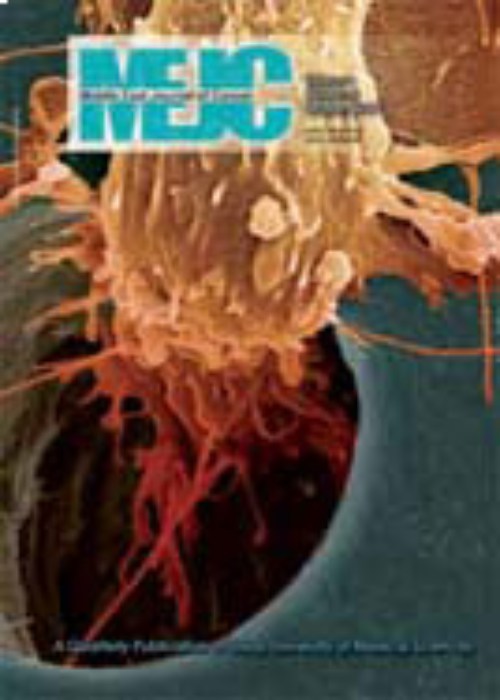The Ability of Polymorphisms in DNA Repair Enzymes to Predict Clinical Outcome in Colorectal Cancer Patients
Author(s):
Article Type:
Research/Original Article (دارای رتبه معتبر)
Abstract:
Background
Genomic polymorphisms of DNA repair enzymes/excision repair cross complementation group 1 (ERCC1), excision repair cross complementation group 2 (ERCC2), and X-ray repair cross complementation group 1 (XRCC1) correlate with survival and therapeutic responses in colorectal cancer (CRC) patients. Therefore, the present study examined the frequency of ERCC1 C118T, ERCC2 Lys751Gln, and XRCC1 Arg399Gln polymorphisms and their prognostic and predictive values in CRC patients. Method
In this retrospective study, a total of 143 CRC patients were evaluated for these polymorphisms by PCR-RFLP. Results
The majority of the patients showed heterozygous C/T (56%) compared to wild type C/C (29%) and variant T/T (15%) genotypes for ERCC1 C118T polymorphism. ERCC2 Lys751Gln polymorphism showed wild type A/A (44%), heterozygous A/C (40%), and variant C/C genotypes (16%). The frequency of XRCC1 Arg399Gln polymorphism was 48% (wild type G/G), 42% (heterozygous G/A), and 10% (variant A/A). The relapse-free survival (RFS) significantly decreased in patients with ERCC1 118 C/C wild type genotype in the subgroups of patients with advanced stage and colon cancer; however, variant T/T genotype correlated with reduced overall survival (OS) in patients treated with combined drug 5-FU/Oxaliplatin. Taken together, in CRC patients and patients treated with 5-FU/Oxaliplatin, ERCC2 Lys751Gln A/A wild type genotype led to significantly unfavorable clinical outcomes. However, XRCC1 Arg399Gln polymorphism did not show any significant association with prognosis. Additionally, on analyzing combined effect of ERCC1 and ERCC2 polymorphisms, a significant reduced OS in patients with both unfavorable genotypes (ERCC1: C/C and ERCC2: A/A) was found. Furthermore, in the subgroup of patients treated with 5-FU/Oxaliplatin, RFS and OS significantly decreased in patients with both unfavorable genotypes (ERCC1: T/T and ERCC2: A/A). Conclusion
The significant relationship of ERCC1 C118T and ERCC2 Lys751Gln polymorphisms with prognosis and treatment response reflects the vital role of these molecules as prognostic and predictive markers in patients with CRC. Additionally, the combined evaluation of ERCC1 and ERCC2 polymorphisms might identify high risk CRC patients with poor prognosis.Keywords:
ERCC1 , ERCC2 , XRCC1 , Polymorphism , Colorectal cancer , Prognosis
Language:
English
Published:
Middle East Journal of Cancer, Volume:11 Issue: 3, Jul 2020
Pages:
260 to 272
magiran.com/p2149180
دانلود و مطالعه متن این مقاله با یکی از روشهای زیر امکان پذیر است:
اشتراک شخصی
با عضویت و پرداخت آنلاین حق اشتراک یکساله به مبلغ 1,390,000ريال میتوانید 70 عنوان مطلب دانلود کنید!
اشتراک سازمانی
به کتابخانه دانشگاه یا محل کار خود پیشنهاد کنید تا اشتراک سازمانی این پایگاه را برای دسترسی نامحدود همه کاربران به متن مطالب تهیه نمایند!
توجه!
- حق عضویت دریافتی صرف حمایت از نشریات عضو و نگهداری، تکمیل و توسعه مگیران میشود.
- پرداخت حق اشتراک و دانلود مقالات اجازه بازنشر آن در سایر رسانههای چاپی و دیجیتال را به کاربر نمیدهد.
دسترسی سراسری کاربران دانشگاه پیام نور!
اعضای هیئت علمی و دانشجویان دانشگاه پیام نور در سراسر کشور، در صورت ثبت نام با ایمیل دانشگاهی، تا پایان فروردین ماه 1403 به مقالات سایت دسترسی خواهند داشت!
In order to view content subscription is required
Personal subscription
Subscribe magiran.com for 70 € euros via PayPal and download 70 articles during a year.
Organization subscription
Please contact us to subscribe your university or library for unlimited access!


